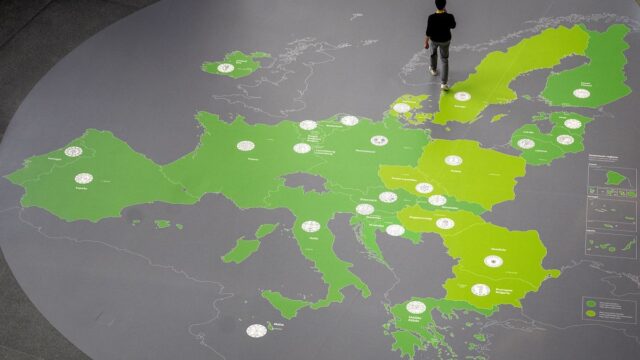Eurozone inflation fell to 2.5% in June, in line with expectations. Belgian inflation reached its highest level in 10 months, while in Germany it fell
After a brief rise in May, the rate of eurozone year-on-year inflation was reduced in June, in line with the economists’ expectations and bolstering hopes of possible interest rate cuts by the European Central Bank (BCE).
The harmonized consumer price index the eurozone rose 2.5% year-on-year in June, a slight decrease compared to the 2.6% registered the previous month, according to Eurostat preliminary estimates published on Tuesday. On a monthly basis, inflation rose 0.2%, maintaining the same pace as in May.
Examining the main components of inflation In the euro zone, services recorded the highest annual rate in June, 4.1%, unchanged from May. Food followed, alcohol and tobaccowith 2.5%, slightly below 2.6% of May; non-energy industrial goods, with 0.7%, stable compared to May; and energy, with 0.2%, below the 0.3% in May. Excluded food and energycore inflation fell from 2.9% year-on-year in May to 2.8% in June, in line with market expectations.
Belgian inflation reaches its highest level in 10 months, while in Germany it falls
Among the members of the eurozone, Belgium experienced stubbornly high inflation in June, with a harmonized annual rate which reached 5.5%, the highest since August 2023. In monthly terms, inflation in Belgium accelerated at a rate of 0.5%.
In the Netherlands, inflation also increased from 2.7% to 3.5%, reaching the highest level since August 2023. Other countries that recorded increases in inflation were Italy, which went from 0.8% year-on-year to 0.9%, and Finland, which rose from 0.4% to 0.6%, although still very below the block average. In Latvia, inflation went from 0% to 1.4%, and in Lithuania, from 0.9% to 1%.
In Germany, harmonized consumer prices rose by 2.5% compared to June 2023, a reduction from the previous rate of 2.8%. In France, inflation slowed from 2.6% year-on-year to 2.5%.
The ECB’s work is not over yet, according to Lagarde
The efforts of the European Central Bank to fight inflation “they are not finished”, and the political leaders They must remain alert, declared its president, Christine Lagarde, on Monday.
In statements prior to the Monetary Policy Forum of the central bank in SintraLagarde mentioned that recent political measures have helped stabilize inflation expectationsand inflation is expected to return to 2% on a sustainable basis in the second half of 2025.
“We still face several uncertainties regarding future inflation,” Lagarde warned, adding that political leaders they will need time to collect sufficient data that allow them to trust that the risks of inflation exceeding the target have been mitigated.
Doing a comparison with the late footballer and coach Sir Bobby Robson, Lagarde stressed that “the first 90 minutes are the most important.” Likewise, he stated: “We will not rest until we win the game and inflation returns al 2%”.
Market reactions
The operators have increased slightly the probability of a ECB rate cut in September, now estimated at 86%. Market participants anticipate a total of 44 basis points on rate cuts between now and the end of the year, suggesting almost two additional policy adjustments by the ECB.
The euro fell 0.2% against the dollar to 1.0716, about to end a three-session winning streak. The euro zone sovereign yields were largely unchanged following the inflation data, with the 2-year Schatz trading at a yield of 2.90%. On Monday, sovereign yields saw a sharp rise, with the Bund adding 10 basis points until reaching 2.60%, driven by a combination of rise in oil prices and political uncertainties in both Europe and the United States.
European stocks fell on Tuesday, with the Euro Stoxx 50 losing more than 1% at 11:20 CET. Both the German DAX and the French CAC 40 rrecorded similar declines. Madrid lagged behind, with the IBEX 35 falling 1.4%, reflecting the low risk sentiment. Munich RE, Bayer and Banco Santander were the most lagging stocks among the 50 largest European stockswith falls of 3.9%, 2.9% and 2.8%, respectively.








